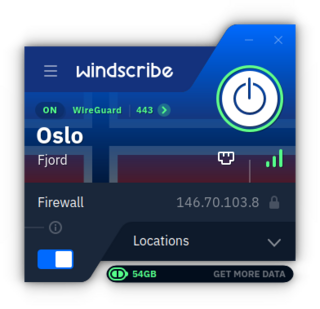
Vladimír Mečiar is a Slovak former politician who served as the prime minister of Slovakia from June 1990 to May 1991, June 1992 to March 1994, and again from December 1994 to October 1998. He was the leader of the Movement for a Democratic Slovakia (HZDS), a populist party in Slovakia.
A virtual private network (VPN) is a mechanism for creating a secure connection between a computing device and a computer network, or between two networks, using an insecure communication medium such as the public Internet.

The Movement for a Democratic Slovakia was a national-populist political party in Slovakia. The party is commonly considered as having been authoritarian and illiberal.
In computer networks, a tunneling protocol is a communication protocol which allows for the movement of data from one network to another. It involves allowing private network communications to be sent across a public network through a process called encapsulation.
Virtual Private LAN Service (VPLS) is a way to provide Ethernet-based multipoint to multipoint communication over IP or MPLS networks. It allows geographically dispersed sites to share an Ethernet broadcast domain by connecting sites through pseudowires. The term sites includes multiplicities of both servers and clients. The technologies that can be used as pseudo-wire can be Ethernet over MPLS, L2TPv3 or even GRE. There are two IETF standards-track RFCs describing VPLS establishment.
Secure Socket Tunneling Protocol (SSTP) is a form of virtual private network (VPN) tunnel that provides a mechanism to transport PPP traffic through an SSL/TLS channel. SSL/TLS provides transport-level security with key negotiation, encryption and traffic integrity checking. The use of SSL/TLS over TCP port 443 allows SSTP to pass through virtually all firewalls and proxy servers except for authenticated web proxies.

The East Sea and Spratly Islands Campaign was a naval operation which took place during the closing days of the Vietnam War in April 1975. The operation took place on Spratly Islands and other islands in the South China Sea. Even though it had no significant impact on the final outcome of the war, the capture of certain South Vietnamese-held Spratly Islands, and other islands on the southeastern coast of Vietnam by the Vietnam People's Navy (VPN) and the Viet Cong (VC) helped the Socialist Republic of Vietnam assert its sovereignty over the various groups of islands after the reunification of the country in 1975. The North Vietnamese objective was to capture all the islands under the occupation of the Army of the Republic of Vietnam (ARVN), and it eventually ended in complete victory for the North Vietnamese.
A mobile virtual private network is a VPN which is capable of persisting during sessions across changes in physical connectivity, point of network attachment, and IP address. The "mobile" in the name refers to the fact that the VPN can change points of network attachment, not necessarily that the mVPN client is a mobile phone or that it is running on a wireless network.
A social VPN is a virtual private network that is created among individual peers, automatically, based on relationships established by them through a social networking service. A social VPN aims at providing peer-to-peer (P2P) network connectivity between a user and his or her friends, in an easy to set up manner that hides from the users the complexity in setting up and maintaining authenticated/encrypted end-to-end VPN tunnels.

VPN blocking is a technique used to block the encrypted protocol tunneling communications methods used by virtual private network (VPN) systems. Often used by large organizations such as national governments or corporations, it can act as a tool for computer security or Internet censorship by preventing the use of VPNs to bypass network firewall systems.

SoftEther VPN is free open-source, cross-platform, multi-protocol VPN client and VPN server software, developed as part of Daiyuu Nobori's master's thesis research at the University of Tsukuba. VPN protocols such as SSL VPN, L2TP/IPsec, OpenVPN, and Microsoft Secure Socket Tunneling Protocol are provided in a single VPN server. It was released using the GPLv2 license on January 4, 2014. The license was switched to Apache License 2.0 on January 21, 2019.
NordVPN is a VPN service provided by company Nordsec Ltd with applications for Microsoft Windows, macOS, Linux, Android, iOS, and Android TV. Manual setup is available for wireless routers, NAS devices, and other platforms.

IPVanish VPN is a US-based VPN service owned by Ziff Davis.

PureVPN is a commercial VPN service owned by GZ Systems Ltd. Founded in 2007, the company is based in the British Virgin Islands.
Ethernet VPN (EVPN) is a technology for carrying layer 2 Ethernet traffic as a virtual private network using wide area network protocols. EVPN technologies include Ethernet over MPLS and Ethernet over VXLAN.

Mozilla VPN is an open-source virtual private network web browser extension, desktop application, and mobile application developed by Mozilla. It launched in beta as Firefox Private Network on September 10, 2019, and officially launched on July 15, 2020, as Mozilla VPN.

Windscribe is a commercial, cross-platform virtual private network (VPN) service provider that is based in Canada, but operates internationally.
A virtual private network (VPN) service provides a proxy server to help users bypass Internet censorship such as geoblocking and users who want to protect their communications against data profiling or MitM attacks on hostile networks.
This page is based on this
Wikipedia article Text is available under the
CC BY-SA 4.0 license; additional terms may apply.
Images, videos and audio are available under their respective licenses.








